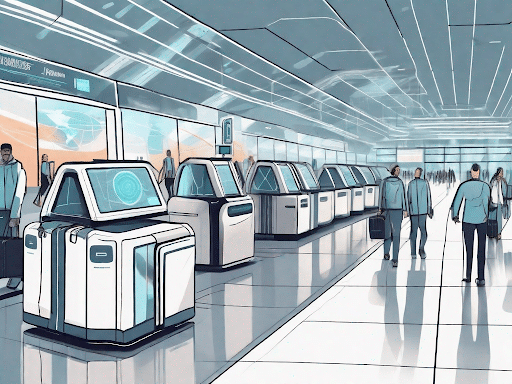With technology advancing at an unprecedented rate, Artificial Intelligence has become crucial for travel companies to adopt AI-based solutions to stay ahead of the competition. In this article, we will delve into the myriad of AI use cases in the travel industry and its potential impact on business operations and customer experiences.
- AI's Impact on Traveling
- Evolution of AI in travel industry
- AI Use Cases for Travel and Tourism Solutions
- Smart booking assistants (Chatbots)
- Personalized travel recommendations
- Sentiment analysis
- Flight forecasting
- Facial recognition
- Baggage handling systems
- Robotized self-service
- Future of AI in the Travel Industry
- 1. Occupancy prediction
- 2. Hyper-personalization
- 3. NLP for translation services
- 4. Artificial intelligence of things
- Challenges for AI in travel
- Conclusion
AI’s Impact on Traveling
In light of the global pandemic’s transformative impact on customer preferences and work dynamics, the travel industry is undergoing a digital renaissance. Embracing social distancing measures has propelled massive digitalization in both personal and professional spheres. As the industry emerges from the challenges of lockdowns, it faces the task of understanding and catering to this new breed of customer.
Businesses in the travel sector are striving to create an ideal service experience, which often entails integrating innovative solutions into their regular operations. The question arises: What tools can companies leverage to regain their competitive edge and recover from the setbacks endured during the pandemic? The answer lies in the realm of artificial intelligence.
In essence, AI has the capability to revolutionize every aspect of the industry. AI-driven travel planners are adept at providing flexible scheduling options and delivering real-time updates and notifications, ensuring maximum satisfaction for travelers. Furthermore, AI-powered feedback analysis tools are invaluable for optimizing error detection, bug fixing, and update deployment processes within the travel domain.
Evolution of AI in travel industry
AI’s integration into travel and tourism empowers both businesses and customers to make significant strides in achieving their market objectives:
- Streamlining international passport verification, security compliance, and other regulatory requirements
- Facilitating travel insurance arrangements and other security measures, including the creation of shareable emergency profiles within AI-driven travel apps
- Enabling pre-travel research on local attractions
- Estimating local accommodation and transportation options based on user-defined search criteria
- Assisting in setting realistic, data-driven budgets for travel endeavors.
Whether it’s optimizing email marketing efforts, enhancing business promotion strategies, or elevating customer experiences, AI stands out as a versatile tool capable of multifaceted contributions. Its versatility is evident in its diverse applications within the travel and tourism sectors.
Even through the utilization of machine learning models, professionals in the travel and tourism realms can continually enhance the intelligence and capabilities of their AI systems. This iterative process transforms AI programs into adaptable tools that provide comprehensive support across various operational facets.
AI Use Cases for Travel and Tourism Solutions
During your travel experiences, you may have encountered various AI tools without fully recognizing their significance. To comprehend the profound influence of artificial intelligence on the industry, it’s essential to explore key use cases where this technology has revolutionized operational efficiency, customer experiences, and business growth strategies.
Smart booking assistants (Chatbots)
With the help of AI, travelers now have access to a wealth of information at their fingertips, making the entire process more efficient and enjoyable. AI-powered chatbots embedded in online platforms facilitate seamless travel bookings for customers. These chatbots leverage machine learning algorithms to understand user preferences, provide personalized recommendations, and streamline the booking process, enhancing overall user satisfaction.
As an example, Skyscanner’s chatbot simplifies travel bookings by offering dynamic pricing and availability information, ensuring users access the best deals effortlessly.
Personalized travel recommendations
Imagine receiving a travel plan curated specifically for you, taking into account your interests, budget, and preferred activities. Machine learning algorithms analyze user behavior and preferences to deliver tailored travel recommendations. This personalization enhances customer engagement and satisfaction, meeting the growing demand for customized travel experiences.
For example, if you are a food lover, AI can suggest culinary hotspots and local food tours in your chosen destination. If you are an adventure seeker, AI can recommend thrilling activities such as bungee jumping or skydiving. The possibilities are endless, and AI ensures that your travel experience is personalized and unforgettable.
Market example: Expedia utilizes AI algorithms to provide personalized hotel recommendations based on user search history, optimizing booking decisions for customers.
Sentiment analysis
Sentiment analysis is pivotal in the travel industry, using AI to gauge customer sentiments from reviews, social media, and comments. It helps businesses understand customer feedback, manage reputation, analyze competitors, improve products/services, handle crises, and conduct market research. This tool is essential for enhancing customer satisfaction, maintaining a positive brand image, and driving growth in the travel and tourism sector.
IBM Watson’s Qualaroo platform enables sentiment analysis, allowing businesses to derive valuable insights from customer feedback and improve service offerings.
Flight forecasting
AI-driven flight forecasting is a game-changer in travel planning, offering accurate predictions of flight prices and availability. Travelers benefit from informed decisions, optimal booking times, and real-time updates for cost savings and itinerary adjustments. For service providers, AI optimizes revenue management, minimizes disruptions, and enhances customer satisfaction through personalized recommendations.
As a market example, Hopper’s AI-powered platform predicts optimal flight prices, helping users secure the best deals and plan their travel itineraries efficiently.
Facial recognition
Facial recognition technology is revolutionizing travel security and efficiency. It speeds up check-ins, enhances security by detecting threats, and offers personalized experiences based on individual preferences. Additionally, it promotes touchless interactions, aligning with health protocols. As this technology evolves, its applications in travel are expanding, from border security to seamless experiences at hotels and attractions.
U.S. Customs and Border Protection (CBP) utilizes facial recognition at airports for quick and secure identity verification, reducing processing times and enhancing security measures.
Baggage handling systems
AI has revolutionized baggage handling systems in the travel industry by improving accuracy, efficiency, and security. With AI-driven computer vision technology, luggage tracking is more precise, reducing misplacements and delays. AI algorithms optimize routing, predict bottlenecks, and enable proactive maintenance, ensuring smooth operations. It also enhances security through facial recognition, verifying passenger identities and safeguarding luggage.
BagsID’s AI-driven baggage handling system at Eindhoven Airport enhances tracking accuracy and customer service, revolutionizing the baggage handling experience.
Robotized self-service
Robotized self-service in the travel industry leverages advanced AI to streamline customer interactions and improve operational efficiency. These AI-powered robots handle multiple tasks simultaneously, reducing waiting times and providing accurate information on destinations, travel logistics, and services. They contribute to cost savings by automating routine tasks like check-in, payments, and concierge services, leading to increased profitability for businesses.
Market Example: Hilton’s robot concierge, Connie, powered by IBM Watson, delivers personalized guest services, demonstrates advanced voice recognition capabilities, and continuously learns to enhance user experiences.
Future of AI in the Travel Industry
As artificial intelligence continues to gain traction across various sectors, including tourism, it’s essential to look ahead and anticipate the future of AI and machine learning in the travel industry.
1. Occupancy prediction
With the global population surpassing eight billion in November 2022, the travel and hospitality sectors face challenges such as increased passenger traffic and limited hotel room availability. Advanced data analytics powered by deep learning algorithms will play a crucial role in accurately predicting occupancy rates, optimizing resources, and enhancing marketing strategies for travel companies.
2. Hyper-personalization
Personalized experiences are a key factor in customer retention. Advancements in hyper-personalization technologies allow businesses to cater to travelers as individuals with unique preferences and traits. This level of precision enables companies to offer tailored products and services, enhancing overall customer satisfaction.
3. NLP for translation services
Natural Language Processing solutions are evolving to provide exquisite translation services across multiple languages. Technologies like OpenAI’s GPT-3 leverage vast data sets to deliver high-quality translations, bridging language barriers and enhancing communication in the travel industry.
4. Artificial intelligence of things
The integration of AI and the IoT will remain a prominent trend in travel and hospitality. An emerging innovation is autonomous cars, exemplified by services like Waymo One’s ride-hailing service in select US cities. While autonomous vehicles eliminate the need for human drivers, ongoing developments focus on ensuring passenger safety and reliability.
Challenges for AI in travel
While AI presents immense potential for the travel industry, it also comes with its fair share of challenges, which are crucial for travel companies to address. By doing so, they can unlock the full potential of AI and create a future where travel is more seamless, personalized, and enjoyable for all.
- Privacy concerns: As AI relies on analyzing large amounts of personal data, there is a need to ensure that this data is handled securely and in compliance with privacy regulations. Travel companies must prioritize data protection and implement robust security measures to safeguard customer information.
- Data security: With the increasing reliance on AI, the volume of data being processed and stored by travel companies is growing exponentially. This data, which includes sensitive information such as credit card details and passport numbers, needs to be protected from cyber threats and breaches. Travel companies must invest in state-of-the-art security systems and regularly update their protocols to stay one step ahead of potential hackers.
- Ethical use of AI: As AI becomes more integrated into the travel industry, there is a need to ensure that it is used responsibly and ethically. This includes addressing biases in AI algorithms, ensuring transparency in decision-making processes, and providing clear guidelines for the use of AI in customer interactions. By adopting ethical AI practices, travel companies can build trust with their customers and foster a positive perception of artificial intelligence travel agency.
Conclusion
The future of AI in travel holds promise for further advancements and the emergence of new services based on technological progress. Companies are increasingly adopting AI to transform transportation, accommodations, travel guides, and more. Accessibility of AR, VR, and AI technologies will expand, catering to diverse audiences.
Additionally, AI developers will focus on enhancing automated processes, strengthening industry connections for supply chain management, fraud detection, risk mitigation, and budget management procedures. The future of AI in travel is bright, with ongoing innovations driving transformative changes across the industry.
With the potential to unlock new opportunities, improve operations, and deliver exceptional customer experiences, AI is reshaping the way travel companies operate. Partnering with an IT company, such as Inoxoft, opens doors to leveraging the full potential of AI in your business. We have a proven track record of tackling business challenges using smart algorithms and are eager to share our expertise with you. Let’s collaborate to unlock the transformative power of AI in travel and take your business to new heights.








